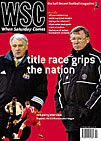 England fans are forced to ticket touts for World Cup 2002 tickets as allocations fail to meet expectations, Mark Perryman reports
England fans are forced to ticket touts for World Cup 2002 tickets as allocations fail to meet expectations, Mark Perryman reports
“Avez-vous des billets?” It was the one French phrase all who followed England to the 1998 World Cup learnt. The market for touted tickets in Japan and Korea this summer will of course be much smaller, with few if any fans turning up just on the off chance of a spare going cheap. But those applying through englandfans, the Official England Supporters Club administered by the FA, have nevertheless been surprised at the barriers in the way of those who do want to get tickets.
With stadium capacities for England’s group games ranging from 63,060 at Saitama to 42,122 at Sapporo, most had reckoned there would be 4,000-6,000 tickets available, based on the customary ten per cent allocation for each competing nation. Many were surprised, therefore, to read in the information sent out by the FA in late January that the allocation for Saitama is only 3,533 and the other two games 2,625 and 2,252. Where had all the seats gone?
The small print revealed that competing nations would receive “eight per cent of the saleable capacity”. This means an astonishing 18,898 seats in Saitama never went on pub lic sale, 29 per cent of the capacity. It was the same story at Sapporo and Osaka, where a total of 26,569 more seats have been taken out of the equation. FIFA’s explanation? Seats have been removed to accommodate advertising hoardings, expanding the media centre, additional camera positions, segregation and VIP area. Add the 21 per cent of tickets which FIFA holds back for all the corporate sponsors plus official guests, and it doesn’t leave too many left for fans of the two countries playing.
Most objections would be settled if major championships split seats 15 per cent to each competing nation, 60 per cent for the host nation and global public sale, with ten per cent for the governing body, their sponsors and guests. There will almost always be more fans wanting tickets for a World Cup finals match than there are seats available, but the current carve-up is anything but equitable.
Domestically, the FA have sought to award tickets on a loyalty basis. Including friendlies, those who had been to five or six games in the qualifying campaign period were guaranteed tickets to all England’s finals matches. Those who had been to four would see at least two group games, plus the knockout stages. The rest were thrown into a ballot. The idea is to treat those who cannot travel to Albania on a Wednesday fairly, but lumping in those who had been to no away games with those who had been to three angered many. A fairer system might have been to have an entry qualification, with a minimum of two away matches attended to qualify for finals tickets.
The FA is supporting fans’ efforts to build a positive culture around following England away. But it is hard to make progress when supporters are required to wait almost two months after the draw is made to hear details of the allocation – long after Irish and German fans heard, for example – and are then given just one week to return applications. On top of this they are expected to pay a whopping five per cent booking fee, at a dollar exchange rate considerably higher than any High Street bank would charge. Oh, and the prices FIFA charge for World Cup tickets have just about doubled since 1998.
Travelling halfway round the world to the World Cup will be the football trip of a lifetime. But for every fan who makes it, maybe another ten will be thinking that they’ll give it a crack come Euro 2004 in Portugal or the 2006 World Cup in Germany. The distance and the cost has unsurprisingly deterred many, so the 2002 ticket allocations have not become quite the issue they might have been. But this is a row that won’t go away. Euro 2004 will be quite different; lessons learned from the World Cup should focus UEFA thinking on the share of tickets and FA practice on how best to distribute them. The issue that should unite all fans of all countries is 15 per cent for each competing nation in Portugal, with any unclaimed tickets from one nation being passed on to the country they are playing against.
From WSC 182 April 2002. What was happening this month